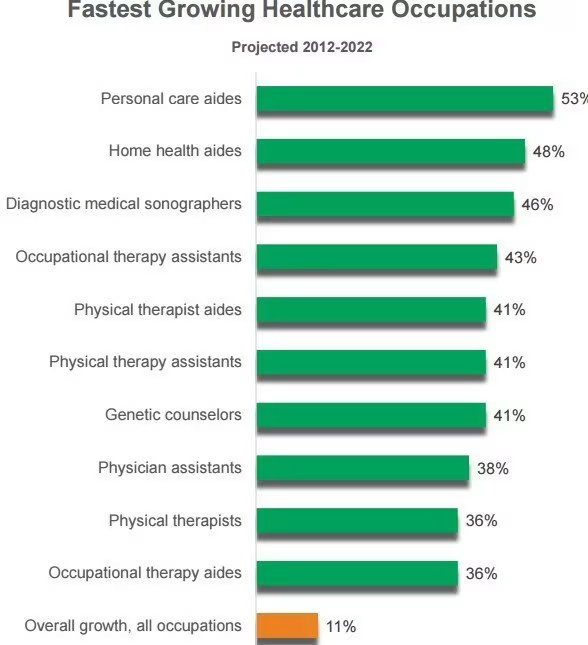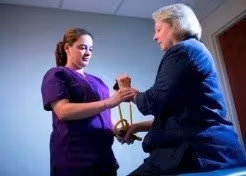Why You Should Choose a Career in the Medical Field
Each blog post is dated and contains accurate information as of that date. Certain information may have changed since the blog post’s publication date. If you would like to confirm the current accuracy of blog information, please visit our online OTA overview page or contact admissions at (877) 233-2677.
Few industries over the past century have seen the kind of consistent increases in demand and job opportunities that healthcare has seen. If we were giving a short answer, demand could sum up why you should choose a career in the medical field. Today, the US health care industry is poised for another big spike in demand, driven by several converging factors: longer human life spans, aging Baby Boomers, new legislation increasing access to care, and millions of healthcare professionals reaching retirement age.
Meanwhile, our educational institutions can’t produce new practitioners as quickly as necessary due to the high cost and complexities of educating health care professionals. As a result, a significant workforce shortage looms on the horizon in the health care industry.

While this may be disconcerting news for those who will need health care services in the future, it presents a huge opportunity for those interested in providing them. In fact, there is perhaps no better time to choose a job in health care, especially one on the front lines of patient care. But how to know where to begin?
Understanding the Big Picture

If you are interested in the health care industry, you may want to start by doing a little homework to understand where the biggest opportunities are and what your best job options may be. Some quick research will allow you to compare different fields in terms of their growth rates, projected job openings, career flexibility, and educational requirements.
For instance, according to the latest data from the Bureau of Labor Statistics, the nursing field is the clear winner in terms of number of job openings projected by 2022. Nursing is also known for healthy salaries and diverse work opportunities, and today’s accelerated programs make it possible to leverage an existing college degree into a Bachelor of Science in Nursing in substantially less time than traditional programs.
However, nursing school is rigorous and intense, and it may not be for everyone. Especially if you aren't looking for a career that requires a lot of time in school. You may be a better fit for Occupational Therapy Assistant. Take a look at our Nursing or OTA blog that compares the two professions. It could offer some helpful insight for you.
The growth in professions based in a home setting speaks to the migration of care beyond the hospital. These types of roles may offer more flexible schedules since they typically involve working closely with a single patient over an extended period of time. The growth in fields like occupational therapy and physical therapy speaks to the increased need for rehabilitation services as patients stay active longer. These types of roles may offer more diverse employment settings, since they typically involved working with patients of all ages and backgrounds.
Websites such as explorehealthcareers.org can be a good place to get an initial feel for the types of careers available to you and what they entail.
Which Medical Field Do You Choose?
Once you understand the options a little better, it’s time to look inward and examine what you’re looking for in a medical career. Think about the following questions:
- Are you a caregiver type who would like to work directly with patients, or someone who’s more comfortable behind the scenes?
- Do you prefer to develop a relationship with one or two patients at a time, or to work with several patients each day?
- Are you open to working various shifts, or do you need a regular 9-5 schedule?
- Do you picture yourself working in a hectic hospital environment or in a quieter setting?
- How do you feel about being active and on your feet all day?
- How much additional education can you afford in order to achieve your employment goals?
- What kinds of changes, if any, are you willing to make to your current lifestyle to move into a health care career?

For many students, therapist or therapy assistant jobs present an attractive option for entering the health care field because the educational programs may have fewer admissions requirements and the jobs themselves encompass a wide variety of employment settings and patient types.
Becoming an occupational therapy assistant (OTA), for example, can be a good point of entry into health care. OTAs work under the supervision of an occupational therapist (OT), but are the professionals who work most closely with the patient in actually carrying out the therapy plan. An OTA program such as St. Kate’s online OTA option allows students to be a Certified OTA (COTA) after just 16 months of online courses, labs, and field work. The program also enrolls students three times year, which allows you to start when you’re ready.
Earning the Credentials
If you’re switching into health care from another field, your first step will likely be to go back to school. Depending on the profession and the type of program you choose (i.e., a traditional campus-based program vs. an online or hybrid program), health care degree programs can take anywhere from 16 months to four years to complete. In most cases, you can expect to have significant hands-on learning requirements as part of the curriculum, fulfilled through skills labs and simulation labs, clinical rotations at area healthcare facilities, and/or fieldwork with patients.
Following the completion of your degree, you may need to take a licensure examination (such as the NCLEX-RN exam for nurses) or earn some other certification in order to practice in your chosen field. Over time, your field might encourage additional certifications, specialization, or other types of continuous learning in order to keep up with the latest trends in patient care.
Reaping the Benefits:
Once you’ve put in the work, you can focus on the benefits of long and rewarding career in healthcare, including:
- Job security
- Flexibility from diverse work environments and patient types
- High salaries and numerous opportunities for advancement
- Multiple options for continuous learning or specialization
- High degree of job satisfaction and the feeling of making a difference
Whether you want to pursue a career as a nurse, an OTA, a home health aide, a physical therapist, a dietitian, a medical office assistant, or something else, there has never been a better time to choose a career in health care. Contribute to the future of a dynamic industry while securing your own future and making an impact on the lives of those around you.
Want to learn more about career opportunities available to occupational therapy assistants? Contact an admissions advisor today.


